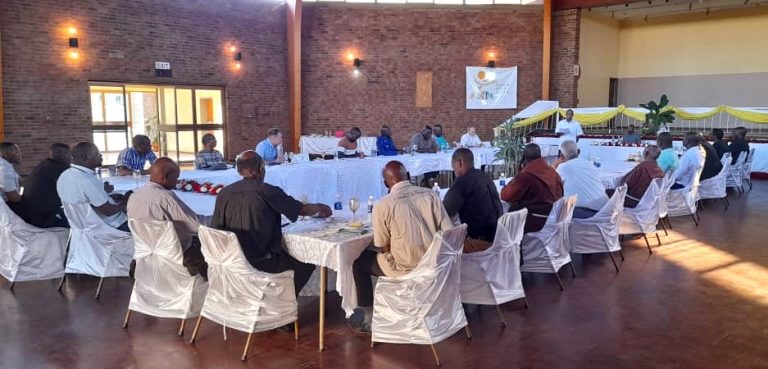
[ad_1]
By Fr. Limukani Ndlovu in Bulawayo

Both the Catholic clergy of the Eastern deanery and the Anglican priests of the Central Archdeaconry of Bulawayo, converged at St. Marys’ Cathedral Minor Basilica hall under the banner, “Journeying in Transformative Ecumenism”. As the traditional adage goes, “Forward ever! Backwards never!” the clergy from the two mainline churches are resolved to continue harvesting the seeds of the synodal process by collaborating together in key areas of common societal, spiritual and pastoral interests.
The meeting held on April 26, 2023 marked the second ecumenical encounter and was graced by the presence of Archbishop Alex Thomas who in his welcome remarks delivered a brief historical, doctrinal and pastoral speech which sought to dispel doubts and fears around the subject of ecumenism. He encouraged the clergy to appreciate that there is more that unites us than what divides us.
During the self-introductory session, Fr. Gabriel Dube the Ghanaian senior priest confessed that he wanted to share something he had never said to anyone before. He had been maliciously accused of wanting to “take land from the blacks and give it to the whites” and faced the possibility of being deported in 2005, only to be released by the Anglican priest after considering and acknowledging the good work he was doing for the community under Dlamini Mission. Rev. Fr. Fritz Madida was by then the resident State Prosecutor at the same time serving as the transitional deacon for St. Francis Anglican Church in Tsholotsho district.
A main presentation on the topic of Transformative Leadership was delivered by an expert Mr. Albert Chapasuka a businessman and philanthropist with charity organizations. Mr. Chapasuka is the former advisor to the Indonesian embassy to Zimbabwe, he runs a borehole drilling company, a pharmaceutical and projects which empower women and men in the mining sector. As part of his charity and corporate responsibility Mr. Chapasuka distributes sanitary pads to rural schools and this brings him a great sense of fulfilment.
In his presentation on transformative leadership, Mr. Chapasuka highlighted that everything falls on leadership, that leadership is the pivot and center of everything. He lamented blind leaders who end up leading others to the pit (cf. Mt 15:14) because of lack of vision, values, perceptions and intuition. “Leadership is a verb… a doing word. A leader is someone with the capacity to influence conditions and the environment one is in. Leaders can determine destiny of life in a given environment”, said Mr. Chapasuka.
The speaker acknowledged the pains of leading people in different difficult predicaments such as hunger, people without water, people experiencing human rights violations, people experiencing high crime rates, drug and substance abuse, people bearing the effects of corruption and political violence. He challenged the clergy not to be involved in acts of corruption but to be involved in nation building without necessarily wearing political jackets.
Priests, permanent and transitory deacons from both the Roman Catholic Church and the Anglican Church were challenged to emulate Jesus Christ, the transformational leader par excellence. In the midst of all challenges, pastors like Jesus “should see what others are not seeing, speak what others are not saying, feel what others are not feeling and be passionate about their ministry, do what others are not doing and always go an extra mile as faithful servants” said Mr. Chapasuka.
Mr. Chapasuka encouraged the clergy to have a spirit of St. Mother Teresa of Calcutta who was rich in her poverty and did not wait for funding to run her charity activities although funding actually followed her during her service to the poor and vulnerable brothers and sisters.
The last part of the session was chaired by the Canon, Fr. Amon Gonte in which members of the clergy explored various areas of future cooperation and various steering committees were established so as to spearhead those thematic areas to collaborate in the future.
Related
Published
[ad_2]
Source link